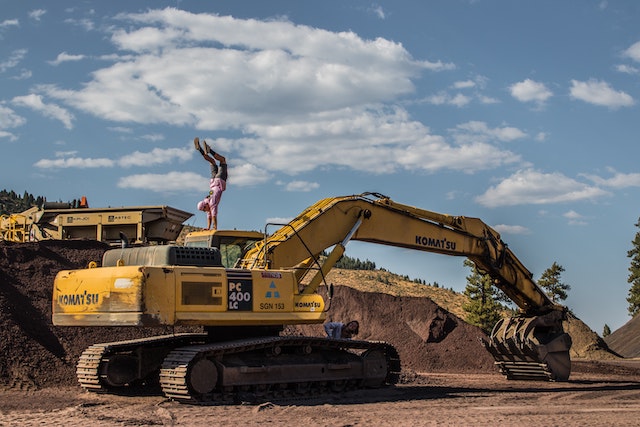Fully Electric Excavators Will Enter the Market by 2025
Photo by Spencer Lind from Pexels
Is the world ready for fully electric construction machinery? Yes, absolutely, and it’s long overdue.
For decades, gas-powered equipment has been the backbone of the construction industry. Excavators, forklifts, tractors, booms, and backhoes have all traditionally run on petroleum fuels like diesel, gas, and oil. Big machines require big power, but it comes at the cost of our environment.
The construction industry contributes 23% of all air pollution on the planet. That’s a big number. The Environmental Protection Agency (EPA) requires construction companies to minimize the discharge of pollutants to reduce the impact on the environment. Reducing the environmental impact of petroleum-based fuels isn’t easy.
With pollution levels higher than ever, some equipment manufacturers, including Bobcat, have been working hard to bring fully-electric compact machinery to the market by 2025. Some electrified equipment is already available.
While electrification won’t reduce all forms of pollution caused by construction work, it will significantly reduce air pollution, and that’s a great place to start. There’s just one question that needs to be answered: will electrified machinery get the job done?
Is fully electric equipment powerful enough for the job?
At first, it might sound strange to consider electric construction machinery. Would a battery-powered backhoe have as much power as its gas equivalent? Would it need to be recharged frequently and impede the operator’s workflow.
Using battery-powered equipment for any job can undoubtedly be challenging. Although, some electrified construction equipment will rely on fuel cells rather than only batteries. Still, there are bigger challenges associated with electrification.
The biggest challenge is seamlessly integrating an electric drivetrain with existing hydraulic systems. To make this work, Bobcat has partnered with Green Machine to create an electric compact excavator retrofit and get it to market by 2025. Bobcat’s compact electric excavator is just one of many electrified machines that will soon be part of the standard Bobcat lineup.
Retrofitting equipment is a great time to inspect all systems
Companies considering the Bobcat retrofit or any other electrified retrofits should verify that all auxiliary hydraulic circuits are using heavy-duty, leak-free couplers. When hydraulic circuits are performing properly, there’s less stress on the machine. Since electrification is fairly new in the construction industry, companies should err on the side of caution and do everything possible to prolong the life of all machinery.
Expect quality when Green Machine is involved
While every machine owner is responsible for proper care and maintenance, quality is high when Green Machine is involved. Green Machine has a strong history of producing electrified retrofits for construction equipment. For example, Green Machine was behind the battery-electric Case 580 EV backhoe unveiled at ConExpo 2020.
Other electrified construction equipment on the market
The Bobcat excavator retrofit isn’t the only electrified machine currently on the market. JCB offers an electric mini-excavator that doesn’t fall short on performance.
Several years ago, in 2017, Komatsu put an electric dump truck with a 600-kilowatt hour battery on the market.
Last but not least, Caterpillar has an electric excavator that has been dubbed “the Tesla of heavy construction equipment.” Caterpillar’s Z-Line excavator comes equipped with a 300- kilowatt-hour battery weighing 3.4 tons, which makes the entire machine 2.4 tons heavier than their 1-ton diesel machine. The battery is said to last between five and seven hours and can recharge fully in two hours.
Electrification is starting with lithium batteries, but not forever
Lithium-ion batteries are prone to a host of problems, most notably the potential to explode. Exploding Samsung Galaxy batteries have sent many people to the hospital. You don’t want to be anywhere near an exploding 2.4-ton lithium-ion battery.
While electrified equipment is currently using lithium-ion batteries, companies are working toward better solutions like fuel cells and other types of environmentally-friendly battery packs. For example, hydrogen fuel cells look promising and are receiving massive investments from manufacturers. Water would be the only emission from a machine powered by hydrogen fuel cells.
Although the need for electric machinery is immediate, it will be a while before electrified machinery goes mainstream. Like all new electric advances, the initial products will need to be used for a while to identify and fix any obvious flaws.
Equipment manufacturers will need to thoroughly test and fix these flaws before electric machinery can hit the mainstream market. Hopefully, by then, lithium-ion battery alternatives will be used to create the ultimate electrified construction equipment lineup.
I’m a single mother of 2 living in Utah writing about startups, business, marketing, entrepreneurship, and health. I also write for Inc, Score, Manta, and Newsblaze

